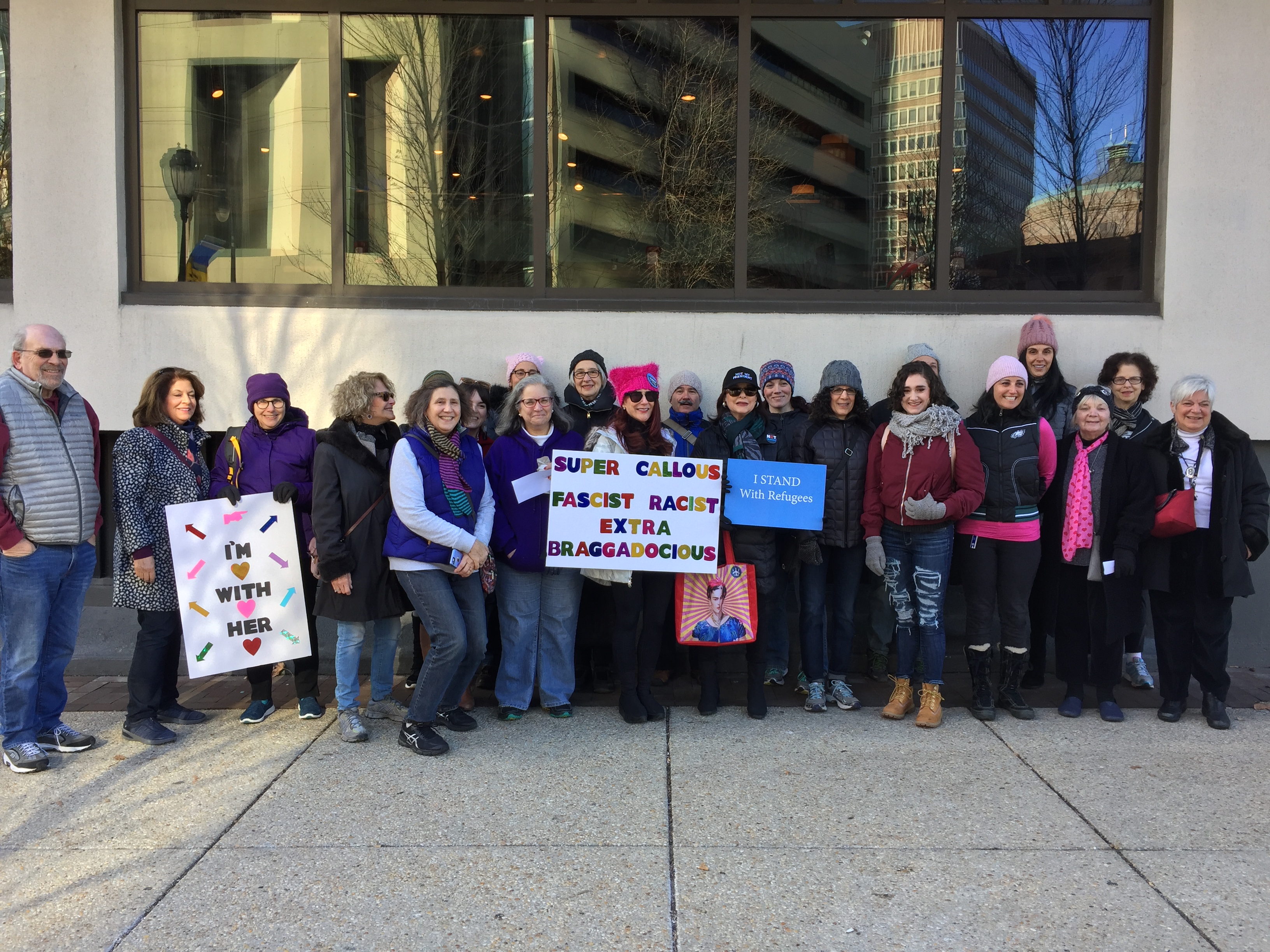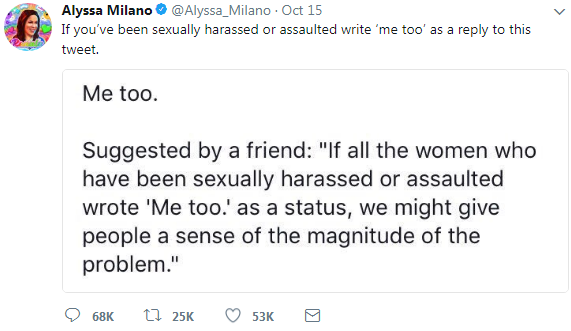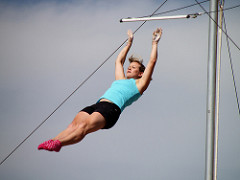This Shabbat, for our benediction, Rabbi Maderer offered these words written by her colleague Rabbi Michael Adam Latz:
To whom am I loyal?
To God.
To my beloved family.
To children everywhere.
To my congregation.Continue reading
This Shabbat, for our benediction, Rabbi Maderer offered these words written by her colleague Rabbi Michael Adam Latz:
To whom am I loyal?
To God.
To my beloved family.
To children everywhere.
To my congregation.Continue reading
Rabbi Maderer delivered this D’var Torah on Shabbat, 8/23
Two days ago, the Reform Movement’s rabbinic arm released the following statement:
“The Central Conference of American Rabbis is dismayed by President Donald J. Trump’s politically charged and divisive statement referring to Jews who vote for Democrats: ‘I think it shows either a total lack of knowledge, or great disloyalty.’ The deployment of this classic antisemitic trope should raise serious concerns for every member of the Jewish community, regardless of one’s political party. Throughout our history, Jews have been maligned by the dangerous, antisemitic speech of individuals in positions of power who accused us of placing loyalty to Israel or Judaism over loyalty to the lands of our sojourn. Often, those accusations have contributed to violence against Jews and expulsion. American Jews are well informed voters—Republicans, Democrats, and Independents—who are deeply devoted to American values, including bipartisan support for Israel. The suggestion that Jews, or any religious group, should be affiliated with any one political party is un-American and should be challenged directly and unequivocally.”
As our Rodeph Shalom clergy and leadership affirmed in our congregational email yesterday, we stand with those words.
Furthermore, I’d like to briefly comment on the most recent events, that led to the absurd disloyalty accusation. As most of you know, I am committed to Israel and believe Israel’s security is critical to the Jewish people. And I care deeply about a Two-State Solution that would offer dignity to the Palestinians.Continue reading
This week’s Torah portion, Bo, includes a text from the Passover seder. Through my family’s seder table ruckus, I always hear the special emphasis my family reads in this part.
“And you shall explain it to your child on that day: ‘It is because of what the Eternal did for me when I went free from Egypt.’
They always emphasize Me. I. “It is because of what the Eternal did for me when I went free from Egypt” (Ex 13:8). What is the point of the emphasis—me, I? It’s personal! Our story of redemption, and the redemption we bring into this world with social justice—it’s personal.
This Shabbat brings the 3rd Women’s March, another step on the road to redemption—a road that for me, feels personal. The ongoing and heightened dilemmas surrounding the March also feel personal.Continue reading
Earlier this summer, some high profile suicide deaths tragically reminded many of us of the critical, life-saving importance of mental health and mental health resources for this public health issue. This was the week the Jewish community read in the Torah from Parashat Shelach Lecha. The story in the Book of Numbers describes the 12 scouts who go ahead to assess the Land of Israel, as the Israelites are anticipating the whole people’s arrival to the land. Two of the scouts felt confident enough to move forward: Joshua and Caleb. The other ten scouts were too discouraged by what they saw. For when they approached the land, they perceived its inhabitants as giants, and in their own eyes, they were as grasshoppers.
Grasshoppers. Any of us can feel small. But when someone feels so small, so grasshopper-like, and sees everything else as a giant, the world can feel impossible, and despair can overwhelm.
More and more, our society is offering important resources to help people who struggle with mental illness and to bring this public health issue out of stigma and into the light. Inspired by our tradition’s mandate of “pekuach nefesh/to save a life” and by our community’s vision to create profound connections, we are learning from such resources.
One way for us to learn is to bring educated sensitivity to our language about difficult issues. From the original creation story’s narrative that God created the world with words, beginning with, “Let there be light,” our people have understood that words can create and words can destroy. In the case of suicide, simple language choices in the media and beyond have the potential to influence behavior negatively by contributing to contagion, or positively by encouraging help-seeking (from: reportingonsuicide.org). In language, we can avoid sensationalist language, method of death, or referring to suicide as successful or unsuccessful. We can say one died by suicide instead of committed, as committing implies criminality when the choice emanates from inconceivable despair. We can emphasize crisis center resources, include warning signs and resources.
Within our congregation, we strive to de-stigmatize mental illness by bringing it out of the shadows and into the light. We seek ways to support or connect people who are struggling, or whose loved ones are struggling. Our Caring Community is now working to add a related support group; if you would like to be involved, please contact our
}co-chairperson Betsy Fiebach (fiebach@gmail.com).
Your clergy, as well as your Caring Community, is here for you. Jewish Family and Children Services is an important resource. And if you or someone you know is in immediate need of expertise and support, please call the National Suicide Prevention Lifeline (1-800-273-8255) which provides 24/7 free and confidential support for people in distress, prevention and crisis resources for you and your loved ones, and best practices for professionals.
Suicide Awareness: Warning Signs
Suicide Awareness: What to Do
This list is from reportingonsuicide.org
 In an intimate scene in parashat Ki Tisa, God says to Moses: “I will make all my goodness pass before you, and the grace that I grant and the compassion that I show; but you cannot see my face… See there is a place near Me. Station yourself on the rock. And as my Presence passes by, I will put you in a cleft of the rock and shield you with My hand, until I have passed by. Then I will take my hand away and you will see my back; but My face will not be seen.” When we witness divinity, we see God’s back, but not God’s face. We do not see everything. Only part of the picture.
In an intimate scene in parashat Ki Tisa, God says to Moses: “I will make all my goodness pass before you, and the grace that I grant and the compassion that I show; but you cannot see my face… See there is a place near Me. Station yourself on the rock. And as my Presence passes by, I will put you in a cleft of the rock and shield you with My hand, until I have passed by. Then I will take my hand away and you will see my back; but My face will not be seen.” When we witness divinity, we see God’s back, but not God’s face. We do not see everything. Only part of the picture.
Last shabbat, I shared with you my heartbreak over the tragic news of the mass school shooting at Marjory Stoneman Douglas High School, in Parkland, Florida; and I also shared with you the inspiration in the teen-agers activism since. I continue to think of them as I hear from my rabbinic colleagues in Florida, who have been burying the Jewish teens, who are among the slaughtered.
With those students ever still in my heart, I think this Shabbat’s Torah portion points to another angle, in the complex issues around gun violence in our nation. From the cleft of the rock, what am I not seeing? What do I need to acknowledge is there, even if it is not in full view?
A day or 2 after the tragic news of the school shooting, I watched the feature on the morning news. Devastating stories of 17 deaths, teen-agers hiding in closets, teachers heroically shielding their students, and bereavement counseling taking place as the survivors went to therapy, instead of to class.
And then, after this feature, the local news moved on to the next story. It briefly told the story of two shootings in our city, in poor neighborhoods, not far from my home, or from our congregation. I don’t think they devoted even a minute to each of the local shootings. And then they helped me, the viewer, turn away, and barely see the gun violence in our city. Barely even acknowledge the everyday, from my limited perspective.Continue reading

Shabbat shalom! Today, I am grateful to gather—we who call God many different names, and we who choose not to call to God at all—I am grateful to gather together with you!
This season, in our sacred text, the Jewish community reads the story of the Exodus from Egypt.
Our redemption story begins with women. Midwives birth our redemption. Overworked, underpaid; but powerful and brave. How do we know redemption has begun? We see the courage of women.
And our redemption story culminates with women. When we cross the Sea of Reeds to freedom on the other side, “Miriam the prophet takes her timbrel in her hand, and all the women go out with her in song.” How do we know redemption has come? We hear the voice of women.
In our own time, brave women have birthed the next wave of the movement.
Women’s courage and women’s voice are leading; women and men are following in partnership.
We are marching to the other side, and there is no turning back.Continue reading
How has this sexual harassment and assault season of “Me Too” and “Time’s Up” had an impact on the way you think about our society, your social and professional circles, and your Jewish community?
It has been important to see high profile men held accountable for the abuse of power manifested in their sexual misconduct. Yet, with so much reckoning occurring in celebrity circles, I believe we need to be cautious against allowing ourselves to respond as if it were their problem. Sexual harassment and assault, and the imbalance of gender power which is at the root of it all — for these issues are not about sex, they are about power– is all of our problem. The imbalance of gender power devalues women and robs men as well as women of choices in their work and in their lives. It is all of our problem– it’s in our own neighborhood, our own school, our own workplace, our own office, our own desk chair. We all have growth and learning we need to do in order to take steps to dismantle gender power imbalance.Continue reading
In the words inscribed on my tallit, taken from Psalms: Pitchu li sha-arey tzedek, avovam odeh-ya/Open for me the gates of righteousness and I will enter in thanks. As I have stepped through new gates, I enter with profound gratitude.Continue reading
 We have seen the words, “Me Too” on our computer screens all week long. In the wake of the most recent sexual harassment reports, actress Alyssa Milano tweeted: “If you’ve been sexually harassed or assaulted, write ‘me too’ as a reply to this tweet. If all the women who have been sexually harassed or assaulted wrote ‘me too’ as a status, we might give people a sense of the magnitude of the problem.”
We have seen the words, “Me Too” on our computer screens all week long. In the wake of the most recent sexual harassment reports, actress Alyssa Milano tweeted: “If you’ve been sexually harassed or assaulted, write ‘me too’ as a reply to this tweet. If all the women who have been sexually harassed or assaulted wrote ‘me too’ as a status, we might give people a sense of the magnitude of the problem.”
Hundreds of thousands of women (correction: now 1.5 million), and some men too, have added their voices, posting, “me too.” Although it is no woman’s responsibility to post about being harassed or assaulted, the wave of “Me Too” responses has been important. It reminds us that sexual harassment and assault are not products of Hollywood celebrity, some unreal world that has nothing to do with us. It’s your neighbor posting, “Me Too.’ Actually, most of your female neighbors. The “Me Too” campaign is giving people a sense of the magnitude of the problem. And that is a tremendous step.
For, studies show that, most people do not speak up when they experience or witness sexual harassment. Why such silence? What are people afraid of? Losing a job? Perhaps. And understandable. But I believe that most of all, women are trying to protect their dignity– to avoid allowing their character to be put on trial. Continue reading
Or zarua latzadik / Light is sown for the righteous**, words we just sang as the introduction to Kol Nidrei. This Yom Kippur, we search for the light of righteousness that it may illumine our path, and the path for generations to come.
Since our last Yom Kippur together, our world feels different. We have born witness to anti-Semitism and bigotry, meant to keep us from the faith that we have the power to stand in the light. More emboldened than recent memories of hate. No longer hiding behind the white hood. Not limited to the right or left fringes. White supremacists, have desecrated cemeteries, painted swastikas in our city, threatened our Jewish Community Centers, and just last week created a new online presence #Gasthesynagogue. And, in 2017 America, armed Nazis stalked a Reform Jewish synagogue in Charlottesville. According to the Anti-Defamation League, in the first quarter of 2017 anti-semitic incidents in the U.S. surged more than 86%.
What do we do, in the face of heightened Anti-Semitism?Continue reading
 In all of my years preaching from our bimah, I think the sermon about which I have received the most response is the one that described my character revealing challenges in the Whole Foods parking lot. Speaking of which: What do you think of the new Whole Foods? I know that many of you shop there, because I see you there all the time. Even after a year of the new lay-out and new procedures, the new Whole Foods still unsettles me. When I’ve observed my discomfort I’ve thought of you. I’ve thought, every time congregants tell me that change in something as meaningful as synagogue life is difficult, I need to remember this — how disoriented I can feel about something so simple, as a new version of my grocery store. Change– change of all kinds– is hard. Continue reading
In all of my years preaching from our bimah, I think the sermon about which I have received the most response is the one that described my character revealing challenges in the Whole Foods parking lot. Speaking of which: What do you think of the new Whole Foods? I know that many of you shop there, because I see you there all the time. Even after a year of the new lay-out and new procedures, the new Whole Foods still unsettles me. When I’ve observed my discomfort I’ve thought of you. I’ve thought, every time congregants tell me that change in something as meaningful as synagogue life is difficult, I need to remember this — how disoriented I can feel about something so simple, as a new version of my grocery store. Change– change of all kinds– is hard. Continue reading